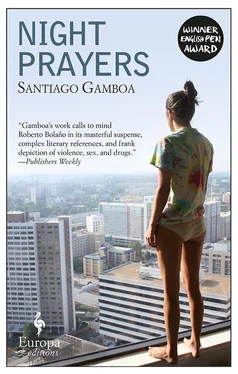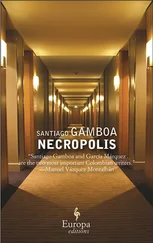“I have to decide what to do with the body,” Juana said, “but to be honest it doesn’t really matter. He isn’t there.”
“Are you going to call your family?” I asked.
“I haven’t thought about it,” Juana said. “I suppose they’ll want to bury him in Bogotá. Manuel would prefer not to go back, but the truth is, none of that matters anymore.”
I filled the glasses again and again, until we had to go down to the 7-11 for another bottle. We drank until dawn.
Teresa and Juana went off to their rooms at six and I remained on the couch, near the window, watching the skyscrapers emerge from the darkness into the clear light of morning.
Before going to sleep I grabbed my toiletry bag, took out my toothbrush, and went to the bathroom. I opened the door slowly, so as not to make a noise, and noticed that there was someone inside. It was Juana. She was naked, and was looking at herself in the mirror. I froze. I had never seen a body like that, with strange, enormous tattoos: Japanese ideograms, suns, Buddhist eyes, yins and yangs, and on her belly a genuine painting, what was it? my God, I recognized it: The Great Wave of Kanagawa by Hokusai! I felt an irrational force pushing me towards her, but I restrained myself. Lower down on her right thigh, she had a version of The Raft of the Medusa by Géricault, and on the left a painting that I identified, not then but a few days later, as The Ninth Wave , by the Russian Ivan Aivazovsky, a painting about which the poet Fernando Denis wrote some revealing verses:
It is already almost night in a painting by Ivan Aivazovsky,
the ninth wave,
beneath the magnanimous sky of the world,
beneath the insane light that gives horror and beauty and tarnishes the dream
that cries out in its colors.
Three shipwrecks plus an incredible number of religious or mystic signs. Added to these were scars and circular burns that seemed to convey some message. I looked at her without moving a muscle, without breathing, to avoid her noticing my presence. She was very beautiful. She had the same expression of weariness that I had seen in the prison and was swaying her head from side to side, as if in time to a lullaby. Then she started to move to the sides and slowly caressed her hips, her stomach, her breasts. She raised her hand to her pubis, tracing circles, slowly at first, but then a little faster and finally frenetically. I felt my body collapse, but made an effort and supported myself. Suddenly she grabbed the tube of toothpaste and penetrated herself with it, moving her fingers very quickly. Seconds later she shuddered, but her weary expression did not fade, not even at that moment.
She struck me as the most beautiful woman in the world, and I knew I loved her. From a distant and impossible place, I loved her.
Then I withdrew without making a noise and went to sleep, feeling excited, guilty, and sad.
When I woke, there was news. The lawyer called to say that the Ministry would take charge of Juana’s stay until she decided what to do with the body, as a courtesy. They didn’t want a scandal.
He also said that the head of the Narcotics Squad had informed him of two cases similar to Manuel’s, with French and Indonesian people involved. Not at the Regency Inn, but at other hotels in the same area.
“It should help us get to the truth,” the lawyer said, “and allow us to file a lawsuit against the state in order to at least obtain some compensation.”
And he added:
“Tell Miss Manrique, and tell her also that I’m well-placed to handle that lawsuit. I know lots of people.”
I really wanted to insult him, but it was Juana who had to decide, so I passed on the lawyer’s words to her. She looked through the window for a moment and said:
“I’d be interested in hearing the conditions. I’d also like to speak with the prosecutor and accept the Ministry’s hospitality while I resolve the matter.”
Two days later Juana moved to a government apartment with Manuelito Sayeq. Teresa and I walked her to the door and I carried her suitcases. She had spoken with her family in Bogotá (she didn’t go into details, and I didn’t ask) and they had decided to bring Manuel back.
When we said goodbye she gave me a long hug, and said in my ear:
“I realized you were in the bathroom the other night, Consul. I felt the way you looked at me, how intensely you looked at me. I heard you breathing, standing there quietly, and I liked it.”
I didn’t know what to say.
“Your tattoos… They’re beautiful.”
“Another day I’ll show them to you properly and tell you the reason for each one, although I suppose you can already imagine. Thank you for everything.”
I said goodbye and told her I’d call her when I got to Delhi, that I’d be in touch to help her. When they came for her, she gave me another nervous, rapid hug. I wanted to ask her what she was planning to do next, where she was hoping to go, but didn’t dare. It had become very clear that Juana wanted to handle her affairs alone and not rely on other people, even when those people claimed to help her. I was also aware of something unusual about her behavior, but was unable to decipher what it was. Then she put the child into the official car, a black Toyota Crown, and I watched them drive away. I waved goodbye, sadly, until the car was swallowed up by the traffic at the end of the avenue.
Had she spoken with her parents? What words had she used to tell (perhaps explain) that difficult story? She realized that the decision wasn’t only down to her. Maybe she had decided to go back to Colombia, at least for a time. After all, it was her country.
That same day I had to fly back to Delhi. Teresa drove me to the airport.
“Will you come back here, now that everything is resolved?” she asked.
“I’d like to see you again,” I said.
“We’ll talk over the phone, we’ll write,” she said. “I’m with you on this. In any case, I’ll keep an eye on Juana, I think we can be friends.”
“Thanks for everything,” I said. “Without you I wouldn’t have been able to get anywhere in this affair.”
Teresa looked at me sadly. “But it turned out badly.”
I gave her a hug and walked toward Immigration. When I turned to wave to her one last time, I saw that she was gone.
A week later, I spoke with Teresa again. I told her I hadn’t been able to get in touch with Juana, who wasn’t returning my calls, and was no longer living in the government apartment. When I didn’t get an answer, I went looking for her and the doorman told me she had left three days earlier. Trying to find out more, I spoke with the lawyer, who said he had not heard from her, but had news about the case. A lieutenant had been arrested and, in order to avoid beheading, had confessed various crimes, including the framing of Manuel. Not that it mattered anymore.
It seemed strange that Juana should have disappeared. I wrote her an e-mail but didn’t get any reply.
A month later, the government of Thailand wrote to the Foreign Ministry in Bogotá, expressing its condolences for the death of Manuel Manrique.
Because I had dealt with the matter, the Consular Department sent me a copy marked FYI.
The note emphasized how important it was to fight the international drug networks, “responsible for tragic situations that ruin the lives of good and innocent people.”
Bogotá answered, thanking them for the letter and promising to bring forward steps for the speedy opening of an embassy in Bangkok.
Sometime later, from my office in Delhi, I wrote Juana an e-mail, without much hope of a reply, asking her where she was and how she was feeling. To my surprise, she replied immediately. “I’m in Paris, Consul, call me at this number.” Surprised, my heart thumping, I dialed the number on my cell phone. Within a few seconds, I heard her voice at the end of the line. She told me Manuel’s body had been flown back to Bogotá and was now in the Jardines de Paz. It had hit her mother hard and she had needed medical attention, but her father had taken it well. The important news, she said, was that she had been in contact with the Thai prosecutor again, because she had decided to write a book about her brother’s case and file a lawsuit at the court in the Hague with a French lawyer who was a friend and associate of the lawyer in Bangkok.
Читать дальше












